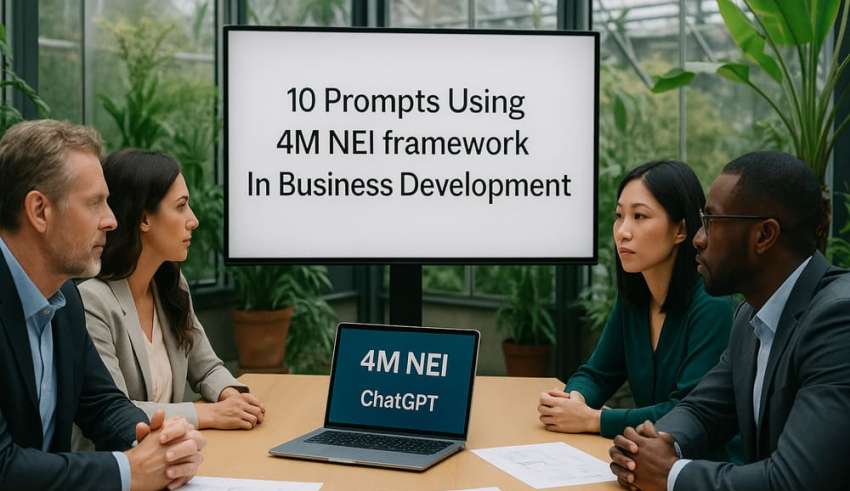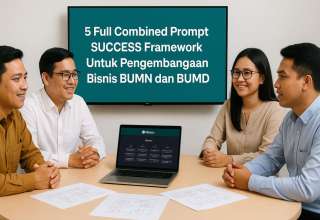
*) Gambar sebagai ilustrasi
Here are 10 prompts that apply your 4M NEI framework (Mudzakarah, Musyawarah, Mujahadah, Muhasabah) to the context of Business Development:
1. Mudzakarah – Reflect on Business Integrity
Reflect in a Mudzakarah style about the role of integrity in business development. What does it mean to build trust with customers, partners, and employees? Share wisdom or principles from spiritual, cultural, or professional traditions that emphasize honesty and transparency. How do reminders about ethical conduct shape long-term growth and brand reputation? Use this as a base to create value-driven business goals.
2. Musyawarah – Collective Decision on Product Expansion
Simulate a Musyawarah between a startup team deliberating whether to expand their product line into a new region. What are the concerns from marketing, finance, operations, and community engagement? Present three perspectives that highlight opportunities, risks, and ethical considerations. End with a consensus that reflects shared vision and long-term sustainability.
3. Mujahadah – Building Entrepreneurial Discipline
Design a Mujahadah plan for an entrepreneur who struggles with time management and distraction. How can they build daily discipline to focus on sales strategy, team leadership, and customer growth? Include actionable steps, such as morning reflections, tech detox hours, or task prioritization routines. Emphasize that business success demands struggle, focus, and personal control.
4. Muhasabah – Weekly Business Growth Reflection
Create a Muhasabah journal prompt for a business founder reviewing their week. Include questions such as: What progress did we make in reaching our KPIs? Where did we waste time or energy? What client feedback did we overlook? What should we improve next week? Use this weekly self-assessment to ensure alignment with business vision.
5. Mudzakarah – Purpose-Driven Business Vision
Hold a Mudzakarah session between founders discussing the original purpose behind their business. What values drove them to create the business in the first place? Have they stayed true to those intentions? How do they reconnect to their “why”? Use this shared reflection to realign vision and mission in the current growth stage.
6. Musyawarah – Strategic Partnership Evaluation
Draft a Musyawarah-based prompt where business stakeholders discuss entering a strategic partnership. What do they stand to gain or lose? How do they assess alignment of values, market access, or risk sharing? Simulate a balanced discussion that leads to a shared decision rooted in long-term benefit, not short-term gain.
7. Mujahadah – Overcoming Fear of Failure
Explore Mujahadah as the internal struggle of a first-time founder dealing with fear of failure. How can they reframe challenges as growth opportunities? What mindset practices, accountability systems, or faith-based reflections can support resilience? Build a narrative that balances vulnerability with strength and reinforces perseverance.
8. Muhasabah – Monthly Sales Reflection Template
Develop a Muhasabah reflection for a monthly sales review. Include these questions: Did we hit our sales targets? Were our offers aligned with customer needs? What strategies worked or failed? What attitude did we bring to each client meeting? Use this to prepare better for the next month’s sales strategy.
9. Musyawarah – Ethical Business Dilemma
Imagine a Musyawarah scenario where company leaders must decide whether to cut costs by laying off part of the workforce. Present different perspectives (e.g., HR, finance, values). Facilitate a consensus that considers both business survival and ethical responsibility. Use the result to inform a sustainable restructuring strategy.
10. Mudzakarah– Sharing Wisdom from Failure
Conduct a Mudzakarah among entrepreneurs about lessons learned from business failures. What went wrong? What would they do differently? How do they now define success? Use this as a knowledge-sharing session that prevents others from repeating the same mistakes. Extract values like humility, patience, and perseverance from the stories.
If you have questions related to the development of solutions and the ChatGPT training we provide and wish to cooperate, please contact us at haitan.rachman@inosi.co.id.









